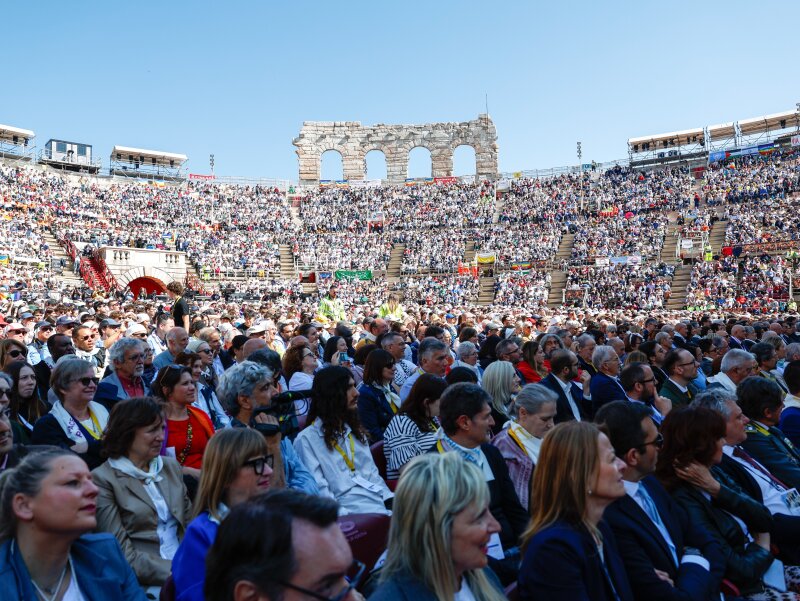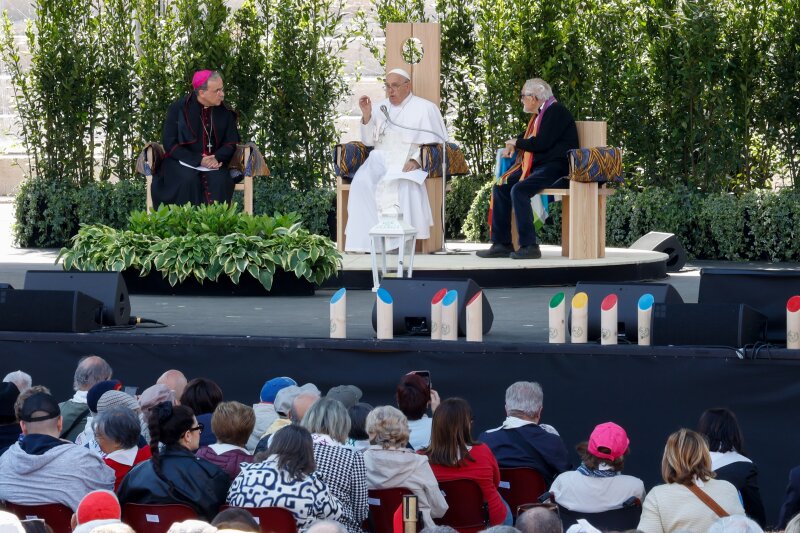
Don't let discord lead to death, pope says in city of Romeo and Juliet
By Cindy Wooden, Catholic News Service
05/21/2024
VERONA, Italy (CNS) — Adults in the world's richest nations deserve "the Pontius Pilate Nobel Prize because we have become experts at washing our hands" of the violence and injustices in the world, Pope Francis said.
Always insisting on having the last word, being concerned only for one's own well-being, investing in weapons manufacturing and thinking that war can solve problems all contribute to a lack of peace in the world, the pope said May 18 at the "Peace Arena" in Verona.
In the Verona Arena, a Roman amphitheater built in the year 30 and famous today as the setting for operas, some 12,500 people involved in popular movements and Catholic organizations committed to service, peace and justice met with the pope to pray for peace.

groups committed to working for peace and justice, listen to
Pope Francis in the Arena in Verona May 18, 2024.
CNS photo/Lola Gomez
In the city that is the setting for Shakespeare's play, "Romeo and Juliet," organizers chose "Justice and Peace Will Kiss" from Psalm 85 as the theme for the pope's visit.
Maoz Inon, an Israeli whose parents were killed Oct. 7 by Hamas militants, and Aziz Sarah, a Palestinian whose brother was killed by Israeli soldiers, were given a standing ovation by the crowd when they spoke arm-in-arm from the same podium.
After they shared their story, they went up to Pope Francis, and the three enclosed each other in a strong embrace as the crowd continued to applaud.
"Please, let's have a short moment of silence, because there isn't much to say after that," the pope said. "Just watch and, seeing the embrace of these two, everyone pray in their hearts to the Lord for peace and make a decision to do something to end wars."
Earlier, responding to questions about peacemaking, Pope Francis insisted that the secret is to start with the small things in life.
"Aggression multiplies," he said. "If someone insults you, you immediately want to double down."
"Once there was a funny scene: A person went to buy something and it was obvious he was not given the right price," the pope said. "He shouted all sorts of things. The store owner listened and then said, 'Sir, are you finished?'
"'Yes,' the customer said. 'Then go take a hike,' the owner said. He didn't use those words -- he used stronger words," the pope said, eliciting laughter. "But he sent him to take a walk. When things start getting heated, go take a walk. Calm down."
On a larger scale, the pope said, people in a society always will have different ideas about how things should go.
"A society without conflict is dead," he said. "A society where there is no dialogue about conflicts is a suicidal society. A society where conflicts are taken in hand and there is dialogue is a society with a future."
Pope Francis ended the morning at Verona's Montorio prison where he met with inmates — women and men — and stayed for lunch.
The pope's staying for a formal program and for lunch did not go unnoticed. Leonardo, 22, welcomed the pope on behalf of all the inmates, telling him, "None of us will ever forget this day. We've noticed you are giving us more time than you did to any other appointment today."
Greeting the inmates and staff in a yard and giving a shout-out to inmates watching from the windows of their cells, Pope Francis told them, "For me, entering a prison is always an important moment, because prison is a place of great humanity — humanity tried, sometimes fatigued by difficulties, guilt, judgments, misunderstandings and suffering, but at the same time filled with strength, a desire for forgiveness, a desire for redemption."

church groups committed to working for peace and justice at
the Arena in Verona May 18, 2024.
CNS photo/Lola Gomez
"In this humanity, here, in all of you, in all of us, is present today the face of Christ, the face of the God of mercy and forgiveness," the pope said.
Before going to the Arena and to the prison, Pope Francis and about 5,500 children and young people were welcomed to the Basilica of St. Zeno by "The Embrace," a 32-foot-tall statue of a smiling Christ with his arms extended wide. The sculpture is made of 300 metal cutouts of children, women and men. The statue, commissioned by the Franciscan Custody of the Holy Land and made in Verona, was planned for the roof of a Catholic school in Jerusalem, and hopes are that one day it can be erected there.
The pope had a brief question-and-answer session with the young people, limiting the questions because, he told them, he did not want it to turn into "a torture session."
A boy asked how children can be peacemakers. The pope responded that they could start simply by not fighting with their siblings, classmates or parents and by sharing always, especially with people who have less than they do.
And, he told them, "do not be afraid to go against the tide if you want to do something good."
Beginning the day with priests and members of religious orders inside the basilica, Pope Francis urged them to never forget that "at the origin of every Christian life, there is the experience of an encounter with the Lord, which does not depend on our merits or commitment, but on the love of the one who comes to seek us, knocking on the door of our hearts and inviting us into a relationship with him."
"We are not better than others. It is pure grace," the pope told them. "He is the one who chose us" and not the other way around.
At the end of the meeting, Verona Bishop Domenico Pompili gave Pope Francis a copy of the baptismal certificate of Father Romano Guardini, a priest, philosopher and theologian, who was born in Verona in 1885, but studied, was ordained and worked in Germany, where he died in 1968. Pope Francis studied the priest's theology and often quotes his work.
-
